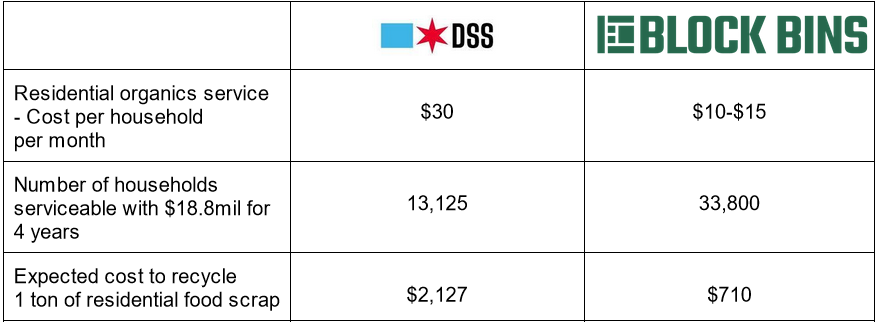Chicago DSS food scrap proposal faces scrutiny - $18M grant, higher costs for residents?
Their proposal would displace existing food-scrap hauling services using taxpayer-subsidies, and after the funding is gone it will leave Chicagoans with a higher compost bill than they currently have today.
Published: 9/3/2024
As a part of the Food Waste Reduction Strategy for the Chicago Metropolitan Region, Chicago Department of Streets & Sanitation (DSS) is seeking funding through the USEPA CPRG grant. In a draft grant proposal, DSS is requesting $18.8 million for a DSS-operated curbside food-scrap recycling program for 5 years, after which the source funding is unclear. DSS is expecting to spend the $18.8mil on 4 years of compost service for 13,125 households, after a one year planning period.
The grant is proposing an effective rate of $30/month per participating household, which is more expensive than current rates for all existing private food-scrap hauling services.
The DSS program will displace less expensive existing services using grant-subsidies, and after the funding is gone it will leave Chicagoans with a higher compost bill than they currently have today.
To provide professional context to DSS’ grant request, with the same resources and starting immediately, Block Bins could provide four years of organic recycling service to more than 33,800 households.

- The DSS proposed program will use subsidies to draw paying-customers away from existing compost haulers.
Even though Chicago's private haulers currently offer lower prices, they will be unable to compete with a “free” program operated by DSS. We estimate there are already close to or above DSS’ goal of 13,125 Chicago households subscribing to paid food-scrap recycling services. We therefore believe the bulk of DSS’ goal will be met with customers who already pay for food-scrap recycling subscriptions.
- In the grant, DSS does not detail where funding will come from after it depletes in 5 years.
We suspect Chicagao taxpayers will eventually bear the cost of the overpriced program.
- We are therefore concerned about the long-term viability of food scrap recycling in Chicago.
We do not believe it would be in Chicago’s best interests to replace inexpensive private hauling services with a government program that uses subsidies that temporarily hide its higher costs from participants.
Block Bins offers two practical suggestions that would significantly advance Chicago’s food scrap initiative at a fraction of the proposed $18.8 million:
1. Provide Chicagoans with vouchers that can be redeemed with any of Chicago’s private food scrap haulers.
DSS’ program is proposing a cost of $30/mo per household, which is more than a monthly subscription from any existing private hauler.
If Chicago wants to provide free composting, a significantly faster and cheaper option would be to offer vouchers with existing services.
The benefits of a voucher program are:
- Immediate results. Eliminates the proposed one year of planning that is projected to cost $4.7 million.
- Leverages and builds on existing compost infrastructure.
- Doesn’t compete with private haulers.
- Delivers composting services to Chicagoans in a more timely manner.
2. Provide information about all available organics hauling services to residential buildings.
This no-cost option comes directly from Chicago's own official waste strategy. From Block Bins’ perspective, awareness is the largest remaining obstacle to organics recycling in Chicago. Our existing drop-off program could serve 3x as many households as it currently does. Chicago’s private haulers would unilaterally benefit from DSS sending out a newsletter about all organic recycling services available to residents.
Final notes
DSS’ request for this compost program jeopardizes Cook County’s entire CPRG grant application, which has many other good initiatives that Block Bins wants to see happen.
Block Bins urges DSS to reconsider their Chicago compost strategy, and to support and collaborate with its private haulers. Chicago’s private compost haulers have valuable experience, infrastructure, resources, and community engagement that will amplify Chicago’s emerging food scrap recycling efforts.